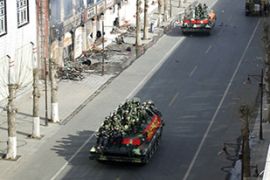China: Tibet protesters ‘surrender’
Protests elsewhere continue as officials warn of “life and death struggle” in Tibet.

Speaking from the Tibetan capital, Lhasa, he said most tourists and other Westerners had been moved well away from the scene of the protests and there was tight security across the city.
‘Life and death struggle’
On Wednesday, the senior communist party official in Tibet was quoted as saying that China faces a “life and death struggle” with followers of the Dalai Lama.
| In depth | |
|
“We are in the midst of a fierce struggle involving blood and fire, a life and death struggle with the Dalai Clique,” Zhang Qingli was told a gathering of the region’s government and Communist party leaders.
“Leaders of the whole country must deeply understand the arduousness, complexity and long-term nature of the struggle.”
The “Dalai Clique” is the term Chinese leaders use to describe followers of the exiled Tibetan leader.
Al Jazeera’s Beijing correspondent, Tony Cheng, said that despite government reports of protesters surrendering, Chinese authorities would be leaving little to chance and were not going to be waiting for people to give themselves up.
He said reports from Lhasa described police conducting house to house searches with lists of names of activists and those they believe were involved in the uprising.
New York-based Human Rights Watch has called on China to allow independent monitors to have access to detained Tibetans, saying the government should publish names of those in custody.
“Given the long and well-documented history of torture of political activists by China‘s security forces, there is every reason to fear for the safety of those recently detained,” Brad Adams, the group’s Asia director, said in a statement.
Protests spread
Meanwhile, protests are reported to be continuing in ethnic Tibetan communities in Chinese provinces outside of Tibet.
 |
| Pictures have emerged of ethnic Tibetans protesting in Gansu province : [AP/CTV] |
The protesters attempted to storm a government building but were repelled by armed police using tear gas.
In frustration they ripped down the Chinese flag from a local school and replaced it with one representing a free Tibet.
There have also been unconfirmed reports of government forces opening fire on a protest in Sichuan, another province bordering Tibet, killing two demonstrators.
Gordon Brown, the British prime minister, said on Wednesday that he was ready to meet the Dalai Lama, after urging Wen Jiabao, the Chinese premier, to end the violence in Tibet.
Brown said he had spoken to Wen by telephone and the Chinese premier had assured him he was willing to hold conditional talks with the Dalai Lama.
Dalai Lama blamed
On Tuesday, Wen accused the Dalai Lama of having “masterminded” the protests – the biggest outpouring of opposition to Chinese rule in almost two decades.
| Tibet key dates |
|
1959 Dalai Lama flees to exile in India after failed uprising against Chinese rule 1960s-70s Hundreds of monasteries destroyed during Chinese Cultural Revolution 1965 China announces creation of Tibet Autonomous Region 1989 Dalai Lama awarded Nobel Peace Prize for leading non-violent struggle for Tibet 2006 Opening of first rail line linking Tibet to rest of China |
Speaking at a press conference in Beijing, Wen said the Dalai Lama’s accusations that China was committing “cultural genocide” in Tibet were “nothing but lies”.
Later, responding to Wen’s comments, the Dalai Lama called for an end to the violence in Tibet and said he would resign as head of the Tibetan government in exile if the situation in his homeland worsened.
“This movement is beyond our control,” he told reporters in the northern Indian town of Dharamsala, home to the Tibetan government in exile.
“If things are getting out of control, then the option is to completely resign.”
Calling for calm, he said: “Don’t commit violence, it is not good. Violence is against human nature, violence is almost suicide. Even if 1,000 Tibetans sacrifice their lives, it will not help.
“We should not develop anti-Chinese feelings. We must live together side by side.”
The Dalai Lama’s officials believe about 100 protesters have been killed as a result of China’s crackdown in Tibet while China says 13 people have died – all civilians attacked by Tibetan rioters.
With access to Tibet tightly controlled, neither figure can be independently verified.
Beijing Olympics
With China‘s preparing to host the Olympics this year, the authorities are keen to stem the violence quickly but are eager also not to be seen as acting too harshly.
 |
| Protesters around the world have been calling for a boycott of the Olympics [Reuters] |
Many pro-Tibetan activists have called for a boycott of the Games, although the Dalai Lama has not raised the issue so far.
Jacques Rogge, the head of the International Olympic Committee, has dismissed talk of a boycott, saying that no government had suggested such action would be a solution.
But on Tuesday, the French foreign minister said the European Union may consider staying away from the Games’ opening ceremony on August 8, although he stopped short of calling for a full boycott.
“Let us consider it,” Bernard Kouchner said, adding that staying away from the opening ceremony would be “less negative than a general boycott of the games”.

